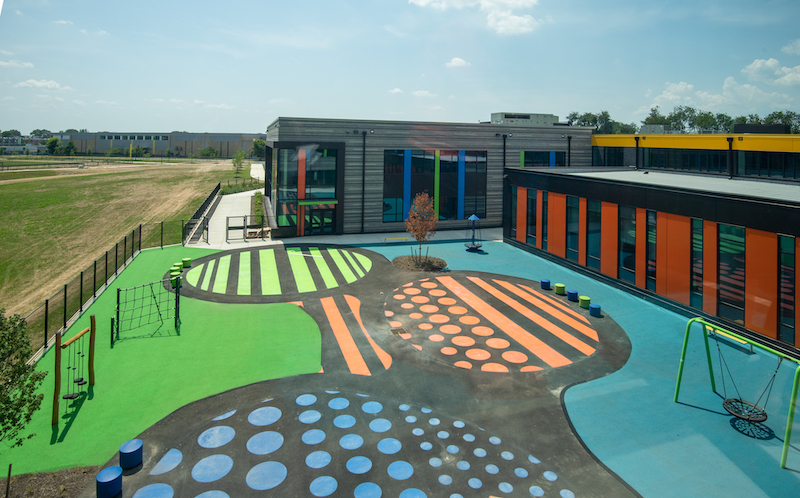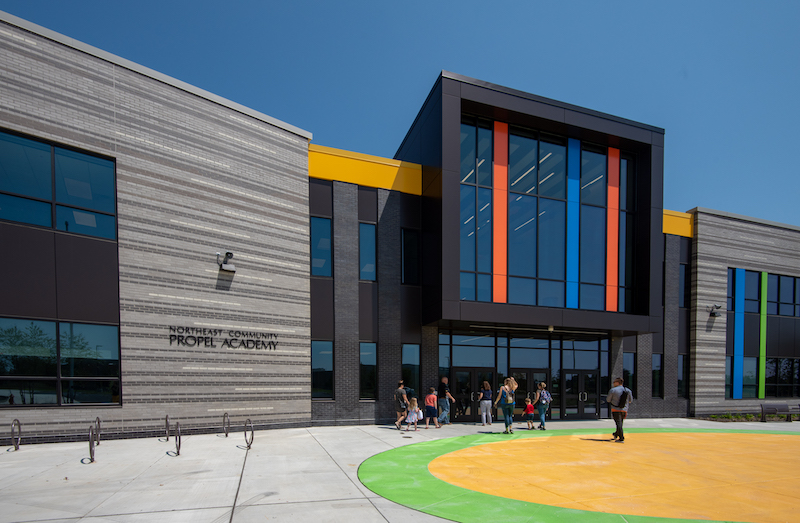Last Tuesday, the Northeast Community Propel Academy, a K-8 school with the capacity for 1,660 students, opened In Philadelphia. The 180,000-sf building was financed and constructed through a public-private partnership between the School District of Philadelphia and Gilbane Development Company, which provided turnkey development for the new school.
Gilbane Building Company acted as the project’s design-builder and hired Stantec as its architect. Gilbane was one of three firms that submitted bid proposals to the school district in the fall of 2017, and received the contract the following January, says Susan Tully, Senior Project Manager and Market Leader for Gilbane’s K-12 Center of Excellence. The school’s design was completed by October 2019, and after some municipal delays construction began in March 2020, “on the day the world stopped” because of the coronavirus pandemic, quipped Tully.
Propel Academy is in a multicultural section of Philadelphia that “is booming,” says Tully, with lots of service sector workers. But the number of school seats hadn’t kept pace with the community’s growth; Tully notes that another school there, built for 600 students, now serves 2,000. The district “knew they need to get a new school built quickly,” she recalls.
The school is on land that previously had served as baseball and softball fields. As part of the P3 agreement, Gilbane Development purchased the land from the school district for $1, and upon completion of construction on August 19, 2021 sold the property and school back to the school district for $79 million.
“Speed to market was a driver” for the P3 arrangement, says Luis Vildostegui, Stantec’s Senior Principal and Education Leader, whom BD+C interviewed with Jennifer Grafton, Stantec’s Project Manager and Senior Associate. Vildostegui notes that Propel Academy’s design reflects the school district’s gravitation toward a more socialized teaching model that focuses on learning with peers.
SCHOOL FEATURES COLLABORATIVE ZONES
Gilbane and Stantec, with Fengate Asset Management, were part of a construction financing consortium that in June broke ground on six K-12 schools in Prince George’s County, Md. This was the first P3 for schools in the nation, and it’s expected to cut in half the time it takes to complete those schools, which are scheduled to open in 2023.
In Philadelphia, the Propel Academy project “is one of the most collaborative I’ve worked on in my career,” says Tully. One of its advantages was Gilbane’s relationship with Stantec, which provided architecture, interior design, and civil engineering services. “We were able to advance the construction before the designs were completed, which fast-tracked the project,” says Grafton. And because Stantec had worked previously with the school district and Gilbane, “we could act as an intermediary” when decisions were made, says Vildostegui.
Stantec’s office in Philadelphia is right across the street from the school district’s, so it set up a big room where all of the project’s stakeholders could meet conveniently. “We were all there, resolving problems from the beginning,” says Vildostegui. Any additions or changes during the design or construction process had to be “cost-neutral solutions,” says Tully. (Nicole Ward, AIA, the school district’s design manager, was its liaison on this project.)
Those discussions included “challenging some basic assumptions,” says Vildostegui, like the building’s placement, which is adjacent to a park that exposures city kids to natural environments they might not see otherwise. During the permitting stage, the building team and school district also hashed out whether a retention basin on the site should be above or below ground (they ultimately chose the latter).
The building team’s early collaboration allowed its members to react quicker when there were materials shortages or delays. “We didn’t need to make compromises,” says Tully.

The Propel Academy was build on land that once served as ball fields, and is located near a tree-lined park.
A ‘SHINING SUCCESS STORY’ FOR P3s
Propel Academy is organized into clusters of classrooms and collaborative zones for small learning groups. There are six classrooms per grade for grades 1-5, and nine classrooms per grade for grades 6-8. The classrooms are positioned around shared media and tech commons within each grade level house, and the number of classrooms can be adjusted as needed.
The school also has science labs, music rooms, and “exploration” spaces, says Grafton. “It’s transformative,” says Vildostegui about the school’s design, that had to meet what Tully calls the school district’s “strict design standards” that are informed by LEED and WELL guidelines.
Tully sees Propel Academy as a “test case” for the school district, and believes P3 financial agreements will be more in vogue for financing school construction to meet clients’ demands for speed. “It’s a shining success story” for the P3 approach, adds Vildostegui. “It’s not for every project, but it’s quicker than a traditional design-bid-build because the issues get moved upfront.”
Related Stories
| Aug 22, 2013
Energy-efficient glazing technology [AIA Course]
This course discuses the latest technological advances in glazing, which make possible ever more efficient enclosures with ever greater glazed area.
| Aug 14, 2013
Five projects receive 2013 Educational Facility Design Excellence Award
The American Institute of Architects (AIA) Committee on Architecture for Education (CAE) has selected five educational and cultural facilities for this year’s CAE Educational Facility Design Awards.
| Aug 14, 2013
Green Building Report [2013 Giants 300 Report]
Building Design+Construction's rankings of the nation's largest green design and construction firms.
| Aug 12, 2013
New York’s first net-zero school will be a sustainability lab for city school system
An elementary school on Staten Island will be the first net-zero energy school in New York City and the Northeast. The school is designed to use half the energy of a typical New York public school. Construction will be completed in 2015.
| Jul 29, 2013
2013 Giants 300 Report
The editors of Building Design+Construction magazine present the findings of the annual Giants 300 Report, which ranks the leading firms in the AEC industry.
| Jul 22, 2013
School officials and parents are asking one question: Can design prevent another Sandy Hook? [2013 Giants 300 Report]
The second deadliest mass shooting by a single person in U.S. history galvanizes school officials, parents, public officials, and police departments, as they scrambled to figure out how to prevent a similar incident in their communities.
| Jul 22, 2013
Top K-12 School Sector Construction Firms [2013 Giants 300 Report]
Gilbane, Balfour Beatty, Turner top Building Design+Construction's 2013 ranking of the largest K-12 school sector contractors and construction management firms in the U.S.
| Jul 22, 2013
Top K-12 School Sector Engineering Firms [2013 Giants 300 Report]
AECOM, URS, STV top Building Design+Construction's 2013 ranking of the largest K-12 school sector engineering and engineering/architecture firms in the U.S.
| Jul 22, 2013
Top K-12 School Sector Architecture Firms [2013 Giants 300 Report]
DLR, SHW top Building Design+Construction's 2013 ranking of the largest K-12 school sector architecture and architecture/engineering firms in the U.S.
| Jul 19, 2013
Reconstruction Sector Construction Firms [2013 Giants 300 Report]
Structure Tone, DPR, Gilbane top Building Design+Construction's 2013 ranking of the largest reconstruction contractor and construction management firms in the U.S.













